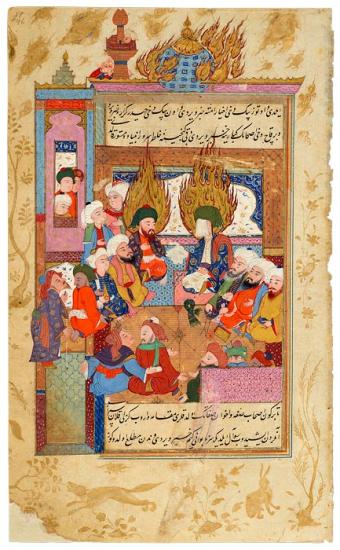
The Prophet Muḥammad Reveals to Calī Secrets Revealed to Him During the Miscrāj (Night Ride to Heaven)
Tarjuma-i Thawāqib-i manāqib (A Translation of Stars of the Legend), in Turkish
The translation was ordered in 1590 by Sultan Murād III (r. 1574–95) from the Persian abridgement of Aflākī.
Purchased by Pierpont Morgan, 1911
Muḥammad, his face veiled, reveals some of the secrets of creation to ˓Alī, his cousin and son-in-law. Both have halos of golden flames, and flames surround the dome of the mosque, signifying a holy event. Ten thousand of the hundred thousand secrets were revealed to ˓Alī alone. Having difficulty keeping them, he shouted them into a well, but a youth made a flute from the tree that grew from the reed in the well, and people came from all over to hear him play. Muḥammad requested to hear the youth perform, declaring that his notes "were the interpretation of the holy mysteries he had confided to ˓Alī." The flute was used ever since as part of the Mevlevī ritual dance (samā˓). Rūmī clearly borrowed the story of the barber who shouted the secret of King Midas's donkey ears into a hole over which reeds grew, the winds whispering the secret to all.
This miniature is part of a sixteenth-century manuscript account of the life and miracles of the Persian poet and mystic known as Rūmī. It is a Turkish translation of an abridged version of the original fourteenth-century Persian account by the dervish known as Aflākī.
Rūmī, Persian Mystic And Poet
The sixteenth-century miniatures presented here concern the life and miracles of Jalāl al-Dīn Rūmī, called Mē vlāna (Our Master), the most famous member of the Mevlevī order and Persia's greatest Sufi mystic and poet. He was born in Balkh in 1207, but his family emigrated after his father foresaw the Mongol conquest. They eventually resettled in Konya, Turkey, then the capital of Anatolian Rūm (thus Rūmī), where the poet died on 17 December 1273.
Several Persian accounts of Rūmī's life have been written, the first by his son, Sultan Walad. The third, laden with moralizing miracle stories, was ordered by Rūmī's grandson Ulu ˓Ārif Chelebi. It was written by the dervish Shams al-Dīn Aḥmad, called Aflākī (d. 1360). Aflākī also incorporated verses from Rūmī's works, notably his six-volume Masnavī (a poetical form of rhyming couplets) and the Dīvān-i-Shams al-Dīn Tabrīzī, named after Shams of Tabriz, the mystic who changed Rūmī's life and transformed him into a poet when they met in 1244.
In 1590—three and a half centuries after Aflākī wrote his life of Rūmī—the Ottoman sultan Mūrad III ordered a Turkish translation of a 1540 abridged version of Aflākī's text entitled Tarjuma-i Thawāqib-i manāqib (Stars of the Legend). The translator was Darvīsh Mahmud Mesnevī Khān of Konya. Two illustrated copies of the Murād translation, both made in Baghdad, survive. One, dated 1599, is held by Topkapi Palace, Istanbul, and has twenty-two miniatures. The other, richer manuscript is held by the Morgan. It dates to the 1590s and includes twenty-nine miniatures. They are all featured here, along with two folios from other collections that are believed to have once been part of the Morgan manuscript.
